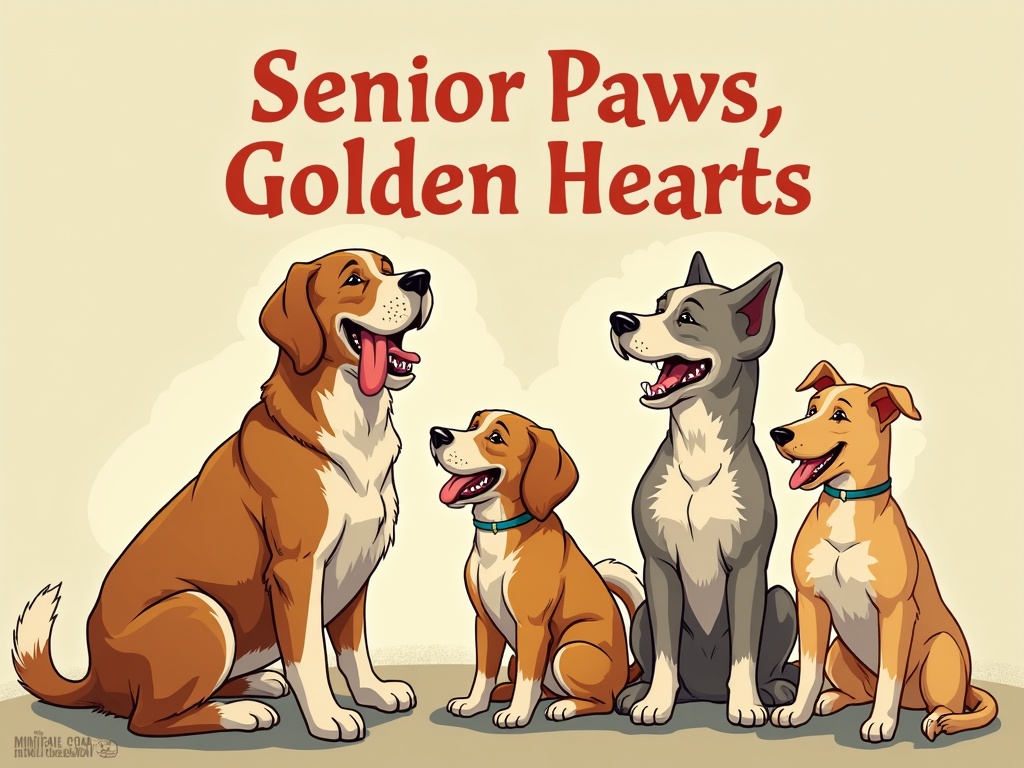Senior Paws, Golden Hearts: The Unexpected Joys of Adopting a Mature Dog
Imagine a pair of soulful eyes, brimming with wisdom and gratitude, gazing up at you. This isn't a fleeting image from a heartwarming movie; it's the reality of adopting a senior dog—a journey filled with unexpected joys and a depth of connection unlike any other. While puppies charm with their boundless energy, seasoned canines offer a unique, often overlooked, companionship. They've already navigated the chaotic puppy phase, learned a thing or two, and are ready to settle into a loving home where they can spend their golden years. But what exactly does it mean to open your heart and home to a senior dog, and why should you consider it? Let's explore.
Understanding the Senior Dog
What exactly constitutes a senior dog? It's not a one-size-fits-all answer. Smaller breeds generally live longer, entering their senior years around 10-12, while larger breeds might be considered seniors at 7 or 8. Understanding the nuances of aging in dogs is crucial for providing the best possible care.
Common Health Issues and How to Prepare
Like humans, senior dogs are more prone to certain health issues. Arthritis, dental disease, cataracts, kidney problems, and heart conditions are among the most common. Being prepared involves understanding these potential issues, having a proactive veterinary plan, and budgeting for potential medical expenses. Early detection and management can significantly improve a senior dog's quality of life.
Changes in Behavior and Energy Levels
Don't be surprised if your senior adoptee prefers shorter walks to marathon runs. Their energy levels will naturally decrease with age. You might also notice changes in their behavior, such as increased sensitivity to loud noises or a decreased tolerance for being left alone. Patience, understanding, and adjustments to their routine will help them feel secure and loved.
Benefits of Choosing a Mature Companion
The rewards of adopting a senior dog are immeasurable, often exceeding those of raising a puppy. Here are some compelling reasons to consider a seasoned canine companion:
Known Personality and Temperament
One of the biggest advantages is their established personality. What you see is generally what you get. Shelters and rescues can provide valuable insights into a senior dog's temperament, allowing you to choose a dog that truly matches your lifestyle and preferences. No more guesswork about how a puppy's personality will develop!
Already House-Trained and Knows Basic Commands
Say goodbye to endless potty training! Most senior dogs are already house-trained and know basic commands like sit, stay, and come. This translates to less stress and a quicker integration into your home. Of course, every dog is an individual, but the foundation is usually already there.
Lower Energy Levels: A Perfect Fit for Some Lifestyles
If you lead a more relaxed lifestyle, a senior dog could be the perfect fit. They're often content with gentle walks, leisurely cuddles, and quiet evenings by your side. This makes them ideal companions for seniors, people with disabilities, or anyone who prefers a calmer canine presence.
Instant Companionship and Gratitude
Senior dogs seem to understand they've been given a second chance. Their gratitude is palpable, expressed through unwavering loyalty, gentle nudges, and those unforgettable soulful eyes. They offer instant companionship and a profound sense of purpose to their adopters.
Addressing the Concerns
While the joys of adopting a senior dog are plentiful, it's essential to acknowledge and address the potential concerns.
Cost of Potential Medical Care
Senior dogs are more likely to require medical care. It's wise to factor in potential vet bills when considering adoption. Pet insurance can help offset some costs, and some rescues offer financial assistance for senior dog care. Transparency with your veterinarian about budget concerns can also facilitate collaborative care planning.
Shorter Lifespan and Potential Heartache
The reality is that senior dogs have a shorter lifespan. Saying goodbye is never easy, but the love and companionship they provide in their final years are worth the inevitable heartache. Focus on creating beautiful memories and celebrating their life.
Adjusting to a Senior Dog's Slower Pace
Patience is key. You might need to adjust your routine to accommodate their slower pace, whether it's shorter walks, more frequent breaks, or simply allowing them to rest when they need to. Remember that their limitations are a natural part of aging, and your understanding will make all the difference.
Making Your Senior Dog Comfortable
Creating a loving and supportive environment is paramount to enhancing your senior dog's quality of life.
Creating a Senior-Friendly Home
Small changes can make a big difference. Provide soft bedding for arthritic joints, install ramps or steps to help them access furniture, and ensure food and water are easily accessible. Eliminate slippery surfaces to prevent falls.
Appropriate Exercise and Mental Stimulation
While they may not be up for strenuous activity, senior dogs still need exercise and mental stimulation. Gentle walks, puzzle toys, and interactive games can keep their minds and bodies engaged. Adjust the intensity and duration to their individual capabilities.
Diet and Nutrition Considerations
Consult with your veterinarian about the best diet for your senior dog. They may benefit from specialized food formulated for older dogs, which often contains joint supplements and is easier to digest. Ensure they have access to fresh water at all times.
Regular Veterinary Checkups and Preventative Care
Regular veterinary checkups are crucial for early detection and management of age-related health issues. Discuss preventative care options, such as vaccinations and parasite control, with your veterinarian.
The Adoption Process and Finding the Right Match
Ready to open your heart and home? Here’s how to navigate the adoption process:
Where to Find Senior Dogs Available for Adoption
Start your search at local animal shelters and rescue organizations. Websites like Petfinder and Adopt-a-Pet allow you to search for senior dogs by breed, location, and other criteria. Many breed-specific rescues also specialize in rehoming senior dogs of a particular breed.
Questions to Ask the Shelter About a Dog's History and Health
Ask detailed questions about the dog's history, temperament, medical history, and current health status. Inquire about any known behavioral issues or special needs. The more information you have, the better prepared you'll be.
The Importance of a Meet-and-Greet Before Adoption
A meet-and-greet is essential to ensure a good fit between you and the dog. Observe their interactions with you, your family, and any other pets you may have. This will give you a sense of their personality and compatibility with your household.
Matching a Senior Dog's Personality and Needs with Your Lifestyle
Be honest with yourself about your lifestyle and what you can realistically offer a senior dog. If you're active and enjoy outdoor adventures, a more energetic senior might be a good match. If you prefer a quieter life, a mellow and cuddly senior might be a better fit.
Real-Life Stories
The most compelling evidence of the joys of adopting a senior dog comes from those who've experienced it firsthand.
Consider the story of Mary, who adopted a 12-year-old Golden Retriever named Buddy after losing her husband. Buddy provided unwavering companionship and a sense of purpose during a difficult time. His gentle nature and unconditional love brought immense comfort to Mary.
"Unlock the Secrets to a Blissful, Healthier Puppy: Discover the Benefits of Holistic Housebreaking"
Or take the case of David, a busy professional who adopted a senior Chihuahua named Peanut. Peanut's low-key demeanor and easygoing personality perfectly complemented David's lifestyle. Peanut didn't need long walks or constant attention; he was content to curl up on David's lap while he worked. David often says that Peanut is the best stress reliever he could ask for.
These stories highlight the transformative power of adopting a senior dog. They offer unique companionship and an abundance of love.
Debunking Myths
Several misconceptions surround senior dogs and can deter potential adopters.
Myth: Senior dogs are always sick. While they are more prone to certain health issues, many senior dogs are relatively healthy and enjoy a good quality of life. Regular veterinary care can help manage any existing conditions and prevent new ones.
Myth: Senior dogs can't be trained. Senior dogs can absolutely be trained! They may learn at a slightly slower pace than puppies, but their life experience and desire to please can make them excellent students. Positive reinforcement methods work well with senior dogs.
Myth: Senior dogs are set in their ways and won't adjust to a new home. While senior dogs may have established routines, they are often surprisingly adaptable. With patience, love, and a comfortable environment, they can quickly adjust to a new home and form strong bonds with their new family.
Resources and Support
If you're considering adopting a senior dog, numerous resources are available to support you.
- Websites: The Senior Dogs Project (seniordogs.com) offers valuable information on senior dog care, adoption, and advocacy. The ASPCA and Humane Society websites also provide resources for senior dog owners.
- Books: Living with a Senior Dog by Dr. Debora Seddon is a comprehensive guide to caring for older dogs.
- Support Groups: Online and in-person support groups can connect you with other senior dog owners, providing a valuable sense of community and shared experience.
Financial assistance programs are also available to help with the cost of senior dog medical care. Organizations like The Pet Fund and Frankie's Friends offer grants and financial aid to pet owners in need.
The Lasting Impact
Adopting a senior dog is an act of profound compassion and a rewarding experience. It's about giving a deserving animal a loving home in their golden years and receiving unconditional love and gratitude in return. By opening your heart to a senior dog, you're not just changing their life; you're changing yours as well.
Let's challenge the perception of senior dogs. They're not damaged goods or throwaways. They are wise, loving companions who deserve a chance to live out their days in comfort and happiness. Choose to Adopt a Senior Dog and discover the immeasurable joys of senior paws and golden hearts.


